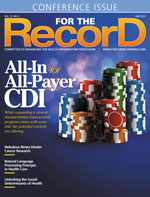May  2019
2019
By the Numbers
For The Record
Vol. 31 No. 5 P. 34
15.9
According to a study published in the BMJ, “Impact of Scribes on Emergency Medicine Doctors’ Productivity and Patient Throughput: Multicentre Randomised Trial,” scribes increased physicians’ productivity from 1.13 to 1.31 patients per hour per doctor, representing a gain of this percentage. Primary consultations increased from 0.83 to 1.04 patients per hour per doctor, representing a 25.6% gain.
$1.65 Million
Projects entered in the Centers for Medicare & Medicaid Services’ (CMS) Artificial Intelligence (AI) Health Outcomes Challenge (https://cmschallenge.ai) have the potential to win up to this amount. The goal is to develop AI-driven predictions that health care providers participating in CMS Innovation Center models can use. The deadline for submitting applications is June 18.
7 in 10
This number of hospitals participated in at least one health information network that is nationwide in scope, according to an Office of the National Coordinator for Health Information Technology data brief.
800
This number of hospitals will have their Medicare payments reduced for patients discharged between last October and this September, according to Kaiser Health News. The Hospital Acquired Conditions Reduction Program penalizes hospitals that fall in the worst-performing quartile each year, regardless of improvement, so 110 hospitals are being penalized in fiscal year 2019 for the fifth straight time.
$2.2 Million
A doctor and his vascular surgery practice in Davenport, Florida, paid more than this amount to settle allegations of health care fraud for filing false claims to federal health programs, reports The Ledger. The claims were for medically unnecessary and non-Medicare reimbursable vein ablations that were upcoded to reflect they were medically necessary.
37
According to a survey by Health Data Management of IT executives at provider organizations, the majority of respondents said value-based care would be extremely important (this percentage), very important (35%), or somewhat important (15%) for their organizations. But when it comes to providing value-based care, 40% said their organizations are either extremely or very effective, 41% said they’re only somewhat effective, and 7% said they were not effective.
$4.5 Billion
The clinical documentation improvement/mid–revenue cycle management market is projected to reach this amount by 2023, up from $3.1 billion in 2018, at a compound annual growth rate of 7.9%, according to a report published by MarketsandMarkets.



